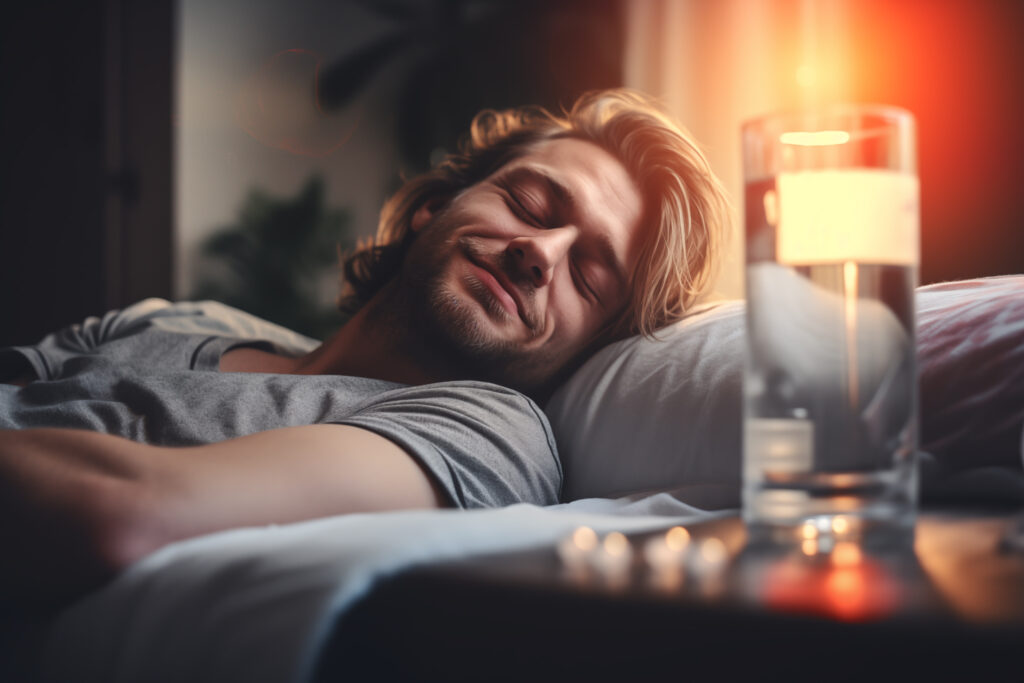
The Role of Melatonin in Treating ADHD-Related Sleep Issues
Do you have ADHD and struggle with sleep? Read our article to learn how melatonin can support better sleep health and rest so you feel your best.

Melatonin is well-known as a sleep supplement, and it can support healthy sleep cycles. However, did you know that it can also aid in the treatment of ADHD-related sleep issues? From insomnia to delayed sleep phase syndrome, you’d be surprised exactly how beneficial this supplement can be for those with ADHD. In this article, we’ll explore five different ways that melatonin treats ADHD-related sleep issues.
We’ll discuss how it regulates sleep patterns, manages sleep disturbances, and even enhances sleep quality. We’ll also expose studies that show how it can benefit ADHDers with delayed sleep phase syndrome and those who struggle with getting to bed at a decent time. By the end of this, you’ll know all that you need so that you can improve your sleep as a fellow ADHDer. No matter if you struggle with insomnia, restless leg syndrome, or even circadian rhythm sleep disorder, you’ll be able to benefit from melatonin and understand its effects.
It Can Regulate Sleep Patterns for ADHDers
One of the first ways that melatonin can treat a number of sleep challenges in those with ADHD is by regulating sleep patterns. For those who are prescribed medication for ADHD, using melatonin to help with sleep can be extremely helpful, especially given how the medication affects them. Medication like methylphenidate (MPH) can actually disrupt sleep patterns and make it harder for kids to fall asleep, and they may even wake up during the night (Source: Neuropsychiatric Disease and Treatment).
However, when they took melatonin, the children in the study demonstrated that the supplement actually improved their sleep patterns, and they slept more soundly. For those who struggle with ADHD and might be taking medication that impairs their sleep, this is excellent news, and it showed that melatonin can add significant benefit to your sleep health.
Melatonin May Manage Sleep Disturbances
Similar to how melatonin can regulate sleep patterns, it can also help manage sleep disturbances, especially for patients or those with ADHD who also struggle with insomnia. In a similar study, children with ADHD taking the same MPH medication for their disorder struggled with sleep disturbances and often encountered symptoms related to insomnia. However, when they were given melatonin, they demonstrated that their symptoms of ADHD-related insomnia were actually dissipating.
More importantly than that, the sleep supplement did not have any adverse effect on them or on their current medication for ADHD. This means that melatonin can actually help alleviate insomnia in those with ADHD and provide them with the resources to have a good night’s rest. This is exceptional news for those who struggle with insomnia but are looking for a natural way to help their sleep without affecting their regular intake of ADHD medication.
The Supplement May Enhance Sleep Quality
It’s no secret that those who have ADHD struggle with sleep, but they also fail to get high-quality sleep. Fortunately, melatonin can be a great resource to enhance their sleep quality and support their overall health. According to an article from Nature and Science of Sleep, those with ADHD actually struggle with worse sleep quality than others because of their disorder. Some of them even have horrible sleep disorders, but with the right supplement, they can alleviate some of these challenges.
Melatonin, when taken before bed, can actually lengthen the total sleep time for many patients with ADHD. One study showed that melatonin can actually enhance your sleep quality because it allows you to sleep sooner after taking the supplement, and it can actually ensure you stay asleep the entire night (Source: PubMed). In other words, if you find yourself yawning and you’re tired throughout the day and you have ADHD, try a melatonin supplement, and you’ll see an improvement in your overall sleep quality.
It Can Benefit Those with Delayed Sleep Phase Syndrome
Many patients who have ADHD also struggle with delayed sleep phase syndrome, but fortunately, melatonin can also assist with this condition. It is a fairly common sleep disorder in ADHD patients, as it makes them fall asleep and wake up at later times. However, when those with ADHD take melatonin, they experience better sleep and an alleviation of their delayed sleep phase syndrome symptoms.
If you struggle with this sleep disorder and ADHD, then it might be beneficial to take some melatonin. Not only will it help you get to bed, but it will also ensure that you stay asleep and wake up feeling rested. However, one final benefit that melatonin provides those with ADHD is the ability to potentially improve one’s sleep onset.
Melatonin May Improve Sleep Onset
For those with ADHD, melatonin can be an excellent resource for supporting better sleep onset and healthier sleep patterns. As mentioned before, one of the common medications, MPH, can actually cause people to struggle with sleep disorders, especially youth and adolescents. Many ADHDers actually develop sleep problems while on MPH.
However, researchers proved that those who took melatonin experienced a better sleep onset time, sometimes up to 47 minutes earlier than before. They also experienced better overall sleep, showing that better sleep onset due to melatonin actually improved how rested they felt when they woke up the next morning (Source: JAACAP). If you struggle with poor sleep and struggle to get to bed on time with ADHD, these studies show that using a supplement like melatonin could be the trick you need to support better rest.
Final Thoughts on Melatonin and Sleep for ADHDers
For those with ADHD, it can be challenging to deal with sleep disorders that come as a result of medication, including insomnia, delayed sleep phase syndrome, and others. Fortunately, melatonin is a proven supplement that can help you get better rest. Due to its ability to regulate sleep, manage sleep disturbances, enhance sleep quality, and even improve sleep onset, this supplement is a must-have for those struggling with poor sleep.
We hope that this article was informative and helped you enhance your sleep health. How will you make changes to improve your sleep health in the future?
FAQ
What’s the best time to take melatonin for ADHD-related sleep issues?
Most experts recommend taking melatonin 30-60 minutes before bedtime. However, those with delayed sleep phase syndrome might benefit from taking it 2-3 hours before their desired sleep time.
Why do people with ADHD tend to be night owls?
ADHD is linked to delayed sleep phase syndrome, meaning the brain’s internal clock runs later than usual. This makes it harder to feel sleepy at a "normal" bedtime.
What if melatonin doesn’t work for me?
If melatonin isn’t helping, you may need to adjust the timing or dosage or try other sleep strategies like white noise, magnesium supplements, or cognitive behavioral therapy for insomnia (CBT-I).
How much melatonin should someone with ADHD take?
A common starting dose is 0.5 mg to 3 mg, but some people may need up to 5 mg. It’s best to start with a low dose and adjust as needed under a doctor’s guidance.
Can melatonin help ADHDers stay asleep longer?
Yes! Research shows melatonin not only helps with falling asleep but also improves overall sleep duration and quality, leading to more restful and uninterrupted sleep.
Does melatonin work for all ADHDers, or just some?
Melatonin helps many people with ADHD, but not everyone responds the same way. Factors like genetics, medication interactions, and underlying sleep disorders can affect how well it works.

Written by
Marie Soukup
Marie Soukup is a seasoned copywriter, editor, and Integrative Nutrition Health Coach with a certificate from the Institute of Integrative Nutrition (IIN). With years of experience working with brands across diverse industries, Marie is passionate about holistic health and crafting compelling content.
Download Pillow
Get help
Press & News
Legal
Connect
X (Twitter)
Company
Copyright © Neybox Digital Ltd.



